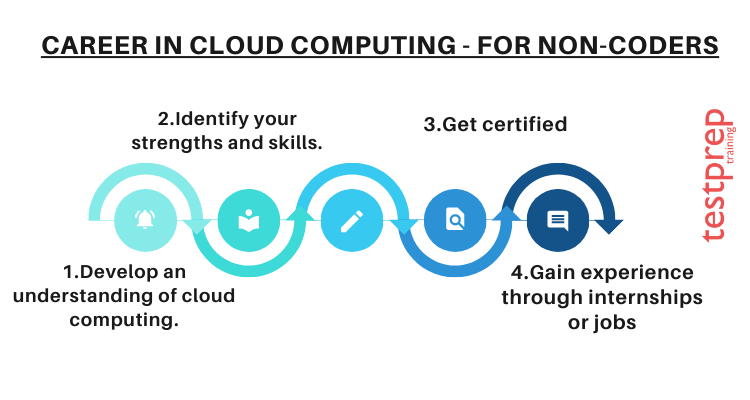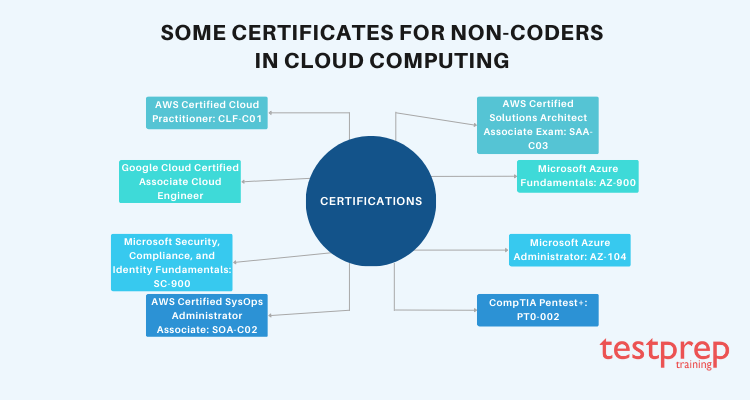Cloud computing is a rapidly growing field with many career opportunities. From cloud architects and engineers to cloud support and sales professionals, there are a variety of roles available to those interested in cloud computing. Indeed, the scope of cloud computing is vast, encompassing infrastructure, platform, and software as a service, as well as emerging technologies such as serverless computing and artificial intelligence. But if you don’t know how to code, you might be in a dilemma if this a right career for you. Are you unsure whether Non-Coders can build a career in cloud computing?
“I’m not a programmer. “
- Can I make a living off of cloud computing? Is coding expertise required for cloud computing?
- What skills should I learn to work in cloud computing ?
But remember, while programming skills can certainly be helpful in cloud computing, they are not always necessary for a successful career in the field.
YES, It is definitely possible for non-coders to build a career in cloud computing. Non-coders can certainly build a career in cloud computing by leveraging their other skills and strengths. Cloud computing encompasses a broad range of roles and responsibilities, and not all of them require programming skills. Some of the non-coding roles in cloud computing include:
- Cloud Sales and Business Development: This role involves selling cloud services to clients and generating new business opportunities for cloud service providers.
- Cloud Architecture and Design: This role involves designing cloud solutions and selecting the appropriate cloud services to meet the needs of the client.
- Cloud Project Management: This role involves managing the implementation of cloud solutions, including the planning, scheduling, and tracking of cloud projects.
- Cloud Security and Compliance: This role involves ensuring the security and compliance of cloud solutions and implementing security measures to protect against cyber threats.
- Cloud Support and Operations: This role involves providing technical support to clients using cloud services, ensuring the smooth operation of cloud solutions, and troubleshooting any issues that arise.
In addition, there are many cloud-related certifications available that do not require programming skills, such as AWS Certified Cloud Practitioner and Microsoft Certified Azure Fundamentals. These certifications can help non-coders to build their skills and knowledge in cloud computing and improve their job prospects.
Lets now look resolve you doubts by answering these questions.
What are the job roles available for Non-Coders?
Cloud computing is a broad field that encompasses many roles, not all requiring programming skills. For example, roles such as cloud architect, cloud sales, cloud support, and cloud project manager do not necessarily require coding expertise. These roles require other skills, such as communication, problem-solving, organizational, and technical skills. As long as you are willing to learn and have a passion for technology, there are many opportunities to build a successful career in cloud computing, even if you don’t have programming skills.
Here are some examples of Job roles in cloud computing that do not necessarily require coding skills:
- Cloud Architect: A cloud architect designs and plans cloud computing systems for businesses and organizations. This role requires a deep understanding of cloud infrastructure, security, and networking, as well as strong communication skills to collaborate with stakeholders and technical teams.
- Cloud Sales: Cloud sales professionals work to promote and sell cloud services to potential customers. They need excellent communication and interpersonal skills to engage with customers, understand their needs, and present the benefits of cloud services.
- Cloud Support: Cloud support professionals help customers troubleshoot technical issues with their cloud systems. This role requires excellent problem-solving and communication skills, as well as a deep understanding of cloud systems and the ability to explain technical issues to non-technical customers.
- Cloud Project Manager: Cloud project managers oversee the planning, implementation, and deployment of cloud systems for businesses and organizations. This role requires excellent organizational and communication skills, as well as a deep understanding of cloud infrastructure and project management methodologies.
- Cloud consulting: As a cloud consultant, you may work with clients to assess their current IT infrastructure and recommend cloud solutions to help them achieve their business goals. This may involve working with a team of analysts and other professionals to develop custom solutions for them.
In short, while coding skills can certainly be an asset in cloud computing, there are plenty of roles in the field that do not require programming expertise. Now, let’s look at how you can build a Career in Cloud Computing being a non programmer –
How to begin your career?

Cloud computing is a rapidly growing field with many career opportunities. To build a successful career in this field, you can begin by following these steps –
- Develop an understanding of cloud computing.
The first step in building a career in cloud computing is to gain a basic understanding of the fundamentals of cloud computing. This can include learning about the different types of cloud services (Infrastructure as a Service, Platform as a Service, and Software as a Service), as well as the benefits and challenges of using cloud services. It is also helpful to understand the major cloud providers such as Amazon Web Services (AWS), Microsoft Azure, and Google Cloud Platform (GCP).
Many resources are available for learning about cloud computing, including online courses, webinars, and tutorials. Some of the best resources include the official documentation and training materials provided by the major cloud providers. Additionally, there are many free and low-cost courses available on platforms such as Coursera, Udemy, and LinkedIn Learning.
- Identify your strengths and skills.
The next step is to identify your strengths and skills, and then look for cloud computing roles that require those skills. For example, if you have strong communication and problem-solving skills, you may be well-suited for a role in cloud consulting. If you have experience in project management, you may be well-suited for a role in cloud project management.
Some other roles that do not require programming skills include cloud sales, cloud support, and cloud business analysis. In general, the key is to look for roles that require a combination of technical and business skills, as these roles are more likely to be accessible to non-programmers.
- Get certified
While programming skills are not always required for cloud computing roles, having certifications can be a major advantage in the job market. Certifications demonstrate that you have a deep understanding of cloud computing and are committed to building your expertise in the field. Additionally, many employers look for candidates with specific certifications when hiring for cloud computing roles.

Some of the most popular cloud computing certifications include the AWS Certified Cloud Practitioner, the Microsoft Azure Fundamentals certification, and the Google Cloud Certified Associate Cloud Engineer certification. These certifications do not require programming skills, and can be obtained through online training and testing programs.
- Gain experience
Finally, gaining experience is essential for building a career in cloud computing. While it can be challenging to gain experience in the field without programming skills, there are still many entry-level roles available, such as cloud support or cloud project coordination. These roles can help you build experience working with cloud technologies, as well as gain exposure to the industry and different roles within the field.
Another option is to work on your own cloud projects, such as building and deploying your own website using cloud services. This can help you gain hands-on experience with cloud technologies, as well as demonstrate your skills to potential employers.
By developing an understanding of cloud computing, identifying your strengths and skills, getting certified, and gaining experience, you can build a successful career in cloud computing, even if you do not have programming skills. Now, you might be wondering if the salary would be as competitive as it is in case of programmers. Let us have a look at that –
Average Salary for Non-Coding Job roles
The average salary for non-coding roles in cloud computing can also vary depending on several factors such as job title, level of experience, location, and specific skills and certifications. However, in general, non-coding roles in cloud computing tend to offer competitive salaries as well.
For example, according to data from the job search site Glassdoor, the average salary for a cloud project manager in the United States is around $100,000 per year. Meanwhile, the average salary for a cloud sales professional can range from $80,000 to $150,000 per year, depending on the experience level and sales performance.
In addition, roles such as cloud support specialist, cloud business analyst, and cloud consultant can also offer competitive salaries, with average salaries ranging from $70,000 to $120,000 per year, depending on the specific role and level of experience.
Final Words
While programming skills can be a significant advantage for a career in cloud computing, they are not necessarily a requirement. Non-programmers can build a successful career in cloud computing by developing a fundamental understanding of the field, identifying their strengths and skills, obtaining relevant certifications, and gaining experience. There are various non-programming roles in cloud computing, such as cloud sales, cloud support, and cloud consulting, that require a combination of technical and business skills.
Pursuing a career in cloud computing as a non-programmer can offer exciting opportunities for growth and development in a rapidly expanding industry with a high demand for skilled professionals. With the right skills and mindset, non-programmers can significantly contribute to the development and expansion of cloud computing technologies and services and build a fulfilling career in this field.


